-
1 of 253523 objects
Lied ohne Worte für das Piano vierhändig (Song Without Words as a Piano Duet) 1847
30.4 x 23.0 cm (book measurement (conservation)) | RCIN 1047149
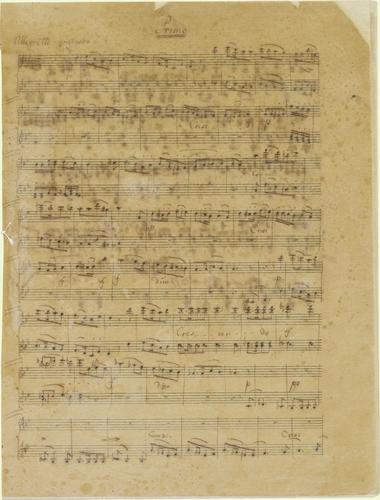
Felix Mendelssohn-Bartholdy (1809-47)
Lied ohne Worte für das Piano vierhändig / von Felix Mendelssohn Bartholdy 1847
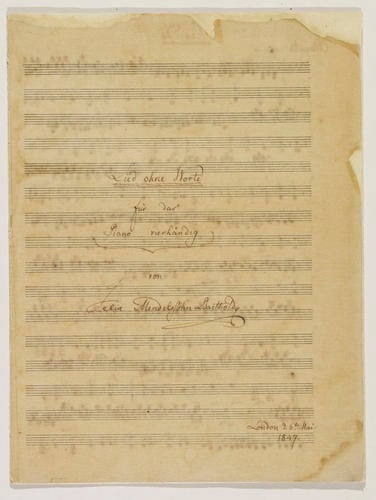
Felix Mendelssohn-Bartholdy (1809-47)
Lied ohne Worte für das Piano vierhändig / von Felix Mendelssohn Bartholdy 1847
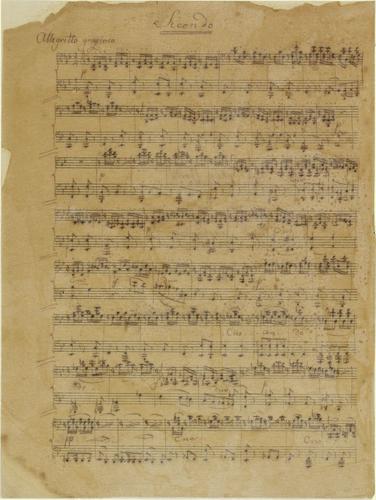
Felix Mendelssohn-Bartholdy (1809-47)
Lied ohne Worte für das Piano vierhändig / von Felix Mendelssohn Bartholdy 1847
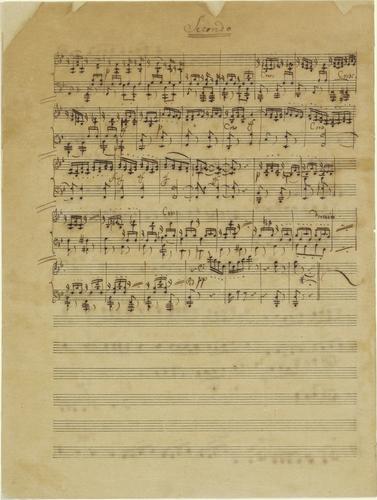
Felix Mendelssohn-Bartholdy (1809-47)
Lied ohne Worte für das Piano vierhändig / von Felix Mendelssohn Bartholdy 1847
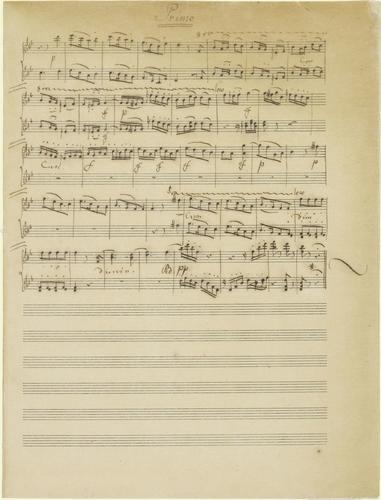
Felix Mendelssohn-Bartholdy (1809-47)
Lied ohne Worte für das Piano vierhändig / von Felix Mendelssohn Bartholdy 1847





-
Music manuscript, 5 pages
This piano duet, presented in 1847, is one of Mendelssohn’s Lieder ohne Worte (Songs without words) and one of several pieces that he arranged for Queen Victoria and Prince Albert to play together. The Lieder were originally written as simple lyrical solo pieces, well within the average pianist’s capabilities, which contributed to their popularity. Eight volumes, six numbers in each, were composed between 1829 and 1845, and published soon after (the final two volumes were published postumously).
Queen Victoria and Prince Albert were well acquainted with Mendelssohn’s music, as the Queen’s piano-teacher, Lucy Anderson, was an enthusiast and the couple had enjoyed playing Carl Czerny’s duet arrangements of some of the Lieder. Mendelssohn subsequently himself arranged the fifth-volume pieces (opus 62, 1844) and one unpublished piece as duets for them, as the Queen noted in her journal ‘We played some of the “Lieder ohne Worte,” which Mendelssohn has kindly arranged for us as Duets' (Journal, 10 June 1844). This 1847 duet was sent to Prince Albert by the composer on 7 May 1847, at the end of what proved to be Mendelssohn’s last visit to London. The solo version appeared posthumously in volume 7, published in 1850 (opus 85, no. 6).
Mendelssohn first met Queen Victoria and Prince Albert in 1842: ‘After dinner came Mendelssohn Bartholdy, whose acquaintance I was so anxious to make’ (16 June 1842). Mendelssohn described the visit in a letter to his mother: ‘Prince Albert sent for me … so that I could also try his organ before I left England. I found him by himself; but while we were talking, in came the Queen, also alone and dressed quite informally’. He persuaded the Prince to play a chorale, which the Prince performed ‘so charmingly, precisely and accurately that it would have done credit to a professional’. He then asked the Queen to sing one of his own songs, and himself improvised on two themes that they suggested – Rule Britannia and the Austrian National Anthem. The Queen was delighted with his skill, writing ‘I have never heard anything so beautiful; the way in which he blended them both together & changed over from one to the other, was quite wonderful as well as the exquisite harmony & feeling he puts into the variations’. Mendelssohn was in London to perform in the Philharmonic Society’s concerts, introducing new works including his Symphony no. 3 in A minor, the ‘Scottish’, whose main theme he had first notated in the ruins of Holyrood Abbey in Edinburgh in 1829, and which he was permitted to dedicate to Queen Victoria.
Mendelssohn often performed for the music societies in London, not only the Philharmonic Society, for whom he conducted a performance of his A Midsummer Night’s Dream in 1844, but also the Concert of Ancient Music, for whom he played Bach in 1847. He also conducted the revision of his oratorio Elijah six times for the Sacred Harmonic Society in that same year. The Queen wrote in her journal on 26 April 1847 about his performance at the Philharmonic Society: ‘nothing came up to Mendelssohn’s playing of that beautiful Concerto, also by Beethoven [no. 4 in G]. It was so full of feeling & soul, & his touch was wonderful’. After attending Elijah on 23 April Prince Albert wrote on his copy of the libretto: ‘To the noble artist who, surrounded by the Baal-worship of debased art, has been able, by his genius and science, to preserve faithfully, like another Elijah, the worship of true art …Inscribed in grateful remembrance by Albert, Buckingham Palace, 24 April 1847’. After Mendelssohn’s untimely death on 4 November that same year, the Queen wrote in her journal ‘We read & played that beautiful “Lied ohne Worte”, which poor Mendelssohn arranged & wrote out himself for us this year. To feel, when one is playing his beautiful music, that he is no more, seems incomprehensible!’ (Journal, 13 November 1847).
Provenance
Specially arranged by Mendelssohn for Queen Victoria and Prince Albert to play together, and presented to Prince Albert by Mendelssohn on 7 May 1847
-
Creator(s)
Acquirer(s)
-
Measurements
30.4 x 23.0 cm (book measurement (conservation))
Category
Alternative title(s)
Lied ohne Worte für das Piano vierhändig / von Felix Mendelssohn Bartholdy.